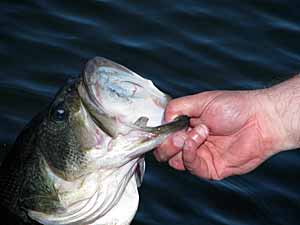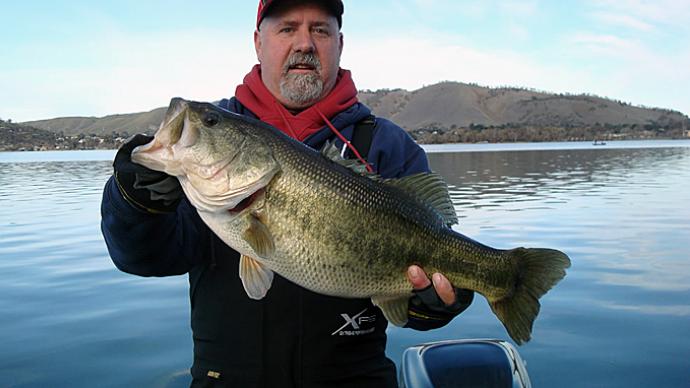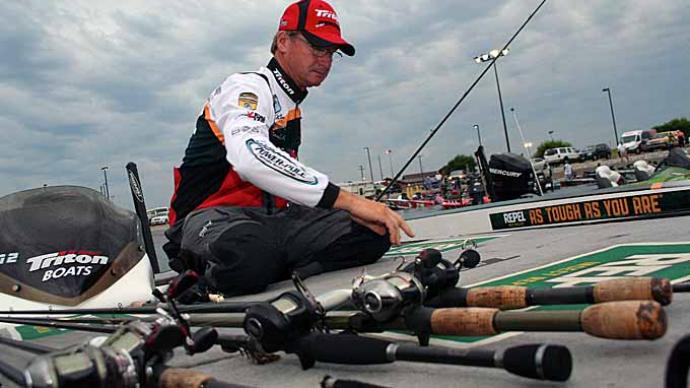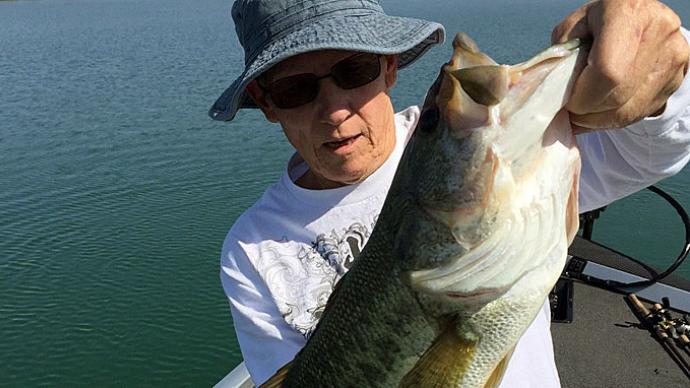
Graceful they are, but polite they are not. A big largemouth bass with a healthy appetite doesn't know the meaning of table manners.
It's more like a fine-tuned eating machine that knows only four modes of operation - catch, kill, and swallow. The fourth comes as naturally as the first three. Start over and repeat the process until the tummy gets full.
So, just how often does a big bass feed? That's a $50,000 question if ever there was one.
Considering its stature in the pecking order, it's only logical to assume a lunker largemouth eats anytime it gets ready. But ask the experts, and they'll tell you feeding cycles fluctuate tremendously during the year, usually coinciding with the changing seasons.
As seasonal weather patterns change, so does a bass' metabolic rate. For example, when water temperatures are moderate during spring and fall, big bass are much more active than in the heat of the summer or dead of winter.
That's not to say fat fish don't eat during the latter two seasons. They do. But the major eating takes place less frequently and doesn't last near as long.
Seasonal changes also play a role in when big bass go on the prowl. Take spring, for instance.
Longer days and extended warming trends cause a noticeable rise in water temperatures. Big bass reacts to the change accordingly, usually by levitating vertically in the water column and gravitating towards the sun-baked shallows, often with an attitude that can be overly aggressive at times.
Perhaps this explains why so many big fish are caught during the midday hours in spring when surface temps are usually warm.
Directly the opposite occurs during the summer months. The best summer fishing typically occurs during low light periods - early morning, late afternoon, and night - when water temperatures are coolest. However, these feeding periods may sometimes become predictable enough to set a watch by.
To illustrate this point, consider an experiment conducted in July 1986 on little Houston County Lake near Crockett, Texas. Big bass guru John Hope implanted a small electronic transmitter in a 12-pound largemouth he'd caught the previous spring. The fish was nicknamed "Wanda."
Hope could track the fish using special telemetry gear and observe her movements daily. However, the fishing guide noticed a definite change in Wanda's behavior once late spring gave way to summer and hot weather set in.
| "Largemouth bass aren't that selective when satisfying an empty gut. When the dinner bell rings, anything is fair game." -- Todd Driscoll |
The fish spent the daylight hours suspended, usually over deep water, and only became active at night, generally at about 9 p.m. She would then move out of deep water and cruise parallel with a nearby shoreline in about 8 feet of water. The activity usually continued into the wee hours of the morning.
"I can't say for certain, but I assume she was feeding when moving up and down that shoreline," Hope said. "In my opinion, a fish feeding is a catchable fish."
Hope proved that point several weeks later when he tracked Wanda to the same shoreline and caught her as she made her midnight rounds. The fish ate a buzzbait, but Hope wasn't working it in a conventional manner.
"I could hear some sort of 'swooshing' noise beneath the surface with my headphones," he recalled. "I assumed it might be some bait fish trying to get away. So I tried to think of a lure to imitate that sound."
Hope cast a buzzbait, let it sink, and then ripped it off the bottom by sweeping his rod sideways. This caused the blade to spin and created a sound that nearly matched the natural sound he'd heard minutes earlier.
Bingo. A few casts later, he was cradling Wanda for a second time.
Hope will never know what type of forage Wanda was feeding on before pouncing on his buzzbait. He assumed it was shad. But considering the largemouth's predatory nature, it could have just as easily been a school of sunfish, crappie, or bass.
Todd Driscoll, a Jasper-based fisheries biologist with the Texas Parks and Wildlife Department, says largemouth bass aren't that selective when satisfying an empty gut. So when the dinner bell rings, anything is fair game.
"A largemouth bass is like any other predator - it's not all that picky about what it eats," Driscoll says. "Bass eat all kinds of critters. However, except during the periods when they are schooling in open water, bass are predominantly shoreline feeders. Therefore, their diet is comprised mostly of the types of forage you find in that type of water - shad, crawfish, and sunfish."
| "A big bass will typically optimize its foraging capabilities by eating a few big meals as opposed to expending all the energy of chasing around a bunch of little ones." -- Todd Driscoll |
There are, however, some exceptions to the rule.
Largemouth have been known to dine on their own kind. Driscoll says the cannibalistic urge probably occurs more frequently during the spring than any other season, mainly because of the sheer numbers of young bass found in the shallows during that period.
Bass also have been known to eat other sports fish occasionally.
My wife and I encountered a 6-pound largemouth float on its side during a recent trip to Lake Nacogdoches in eastern Texas. Closer examination revealed the fish had more than a mouthful. There was a 1 1/4-pound crappie wedged in her mouth.
I snatched the bass by her lower lip and brought her into the boat. It took some coaxing, but I worked the dead crappie free. We watched the big bass swim away a few minutes later.
Driscoll wasn't surprised to learn about the big bass, big crappie episode. That's because big fish are typically more prone to seek out a few sizeable meals than several small ones.
"A big bass will typically optimize its foraging capabilities by eating a few big meals as opposed to expending all the energy of chasing around a bunch of little ones," he said.
| "Every big bass has a different personality. They're sort of like horses. Some horses have good dispositions, whereas others want to kick at everything that walks by. I think you see the same thing with big bass. It's just another wild animal." -- David Campbell |
That brings to the surface another $50,000 question. How much does a healthy 10-pound bass eat?
No one knows because monitoring such a fish in a wild environment is virtually impossible. But based on what he's seen in controlled settings, fisheries biologist David Campbell believes big fish have an equally large appetite.
Campbell has been involved with the Texas, ShareLunker program since its inception in 1986. The program solicits the donation of Texas-caught bass weighing 13 pounds or more for use in spawning and genetics research.
Campbell has handled some 323 ShareLunkers over the last 15 years. So he arguably has more hands-on experience with double-digit bass than anyone in Texas, possibly in the world.
The fisheries scientist believes feeding patterns in big bass vary from fish to fish, just as in people. Some big bass may be so aggressive that they eat or kill everything in their path for the heck of it. Others are more passive and eat only until they get their fill.
"Every big bass has a different personality," says Campbell. "'They're sort of like horses. Some horses have good dispositions, whereas others want to kick at everything that walks by. I think you see the same thing with big bass. It's just another wild animal."
The most aggressive bass Campbell has ever dealt with was the 16-pound, 3-ounce largemouth Troy Johnson caught from Gibbons Creek Reservoir in Central Texas in 1988. Johnson's fish was an extremely aggressive feeder, as reflected in the 2 1/2 pounds she gained during her yearlong stay in the 3,500-gallon lunker tank.
On several occasions, Campbell saw the fish consume as many as 12, 7-inch channel catfish in a single setting.
"She ate over 200 pounds of food in the year we had her," recalled Campbell. "Sometimes, she might go a few days without eating much. But when she did decide to feed, she ate everything we put in front of her."
Perhaps she thought it would be rude if she didn't clean her plate.
Content provided by Bass Fishing Magazine, the official publication of FLW Outdoors




